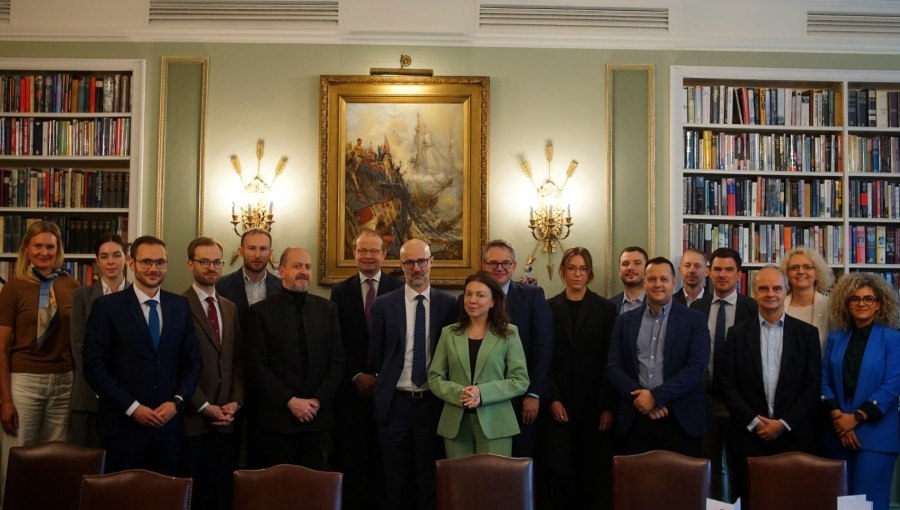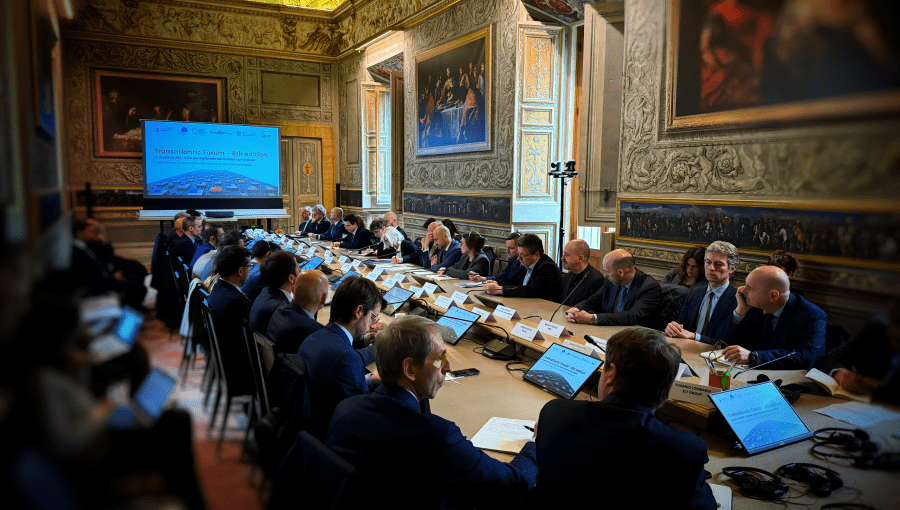A Manifesto on Enforcing Law in the Age of Artificial Intelligence
The Transatlantic Reflection Group on Democracy and the Rule of Law in the Age of AI convened in Rome at John Cabot University to publish “A Manifesto on Enforcing Law in the Age of Artificial Intelligence,” on October 10, 2022. The event was hosted by Francesco Lapenta, Director of the JCU Institute of Future and Innovation Studies.

Transatlantic Consensus Manifesto “Enforcing Law in the Age of Artificial Intelligence”
Paul Nemitz, Dr. Konstantinos Karachalios, and Nicolas Economou founded the Transatlantic Reflection Group on Democracy and the Rule of Law in the Age of Artificial Intelligence in 2021. The group’s independent international experts created the Consensus Manifesto with the support of The Athens Roundtable on AI and the Rule of Law, The Future Society (which launched the initiative in 2021 and the group’s first manifesto), and the Institute of Future and Innovation Studies (which joined and supported the initiative in 2022).
The group will reconvene to present the manifesto at the European Parliament on December 1 at the Athens Roundtable on AI and the Rule of Law, under the auspices of the Presidency of the Hellenic Republic.
AI systems and data-driven business models are increasingly pervasive, affecting how we work, buy, sell, communicate, meet, navigate, and build relationships. In doing so, they impact our individual rights, social relationships, the economy, and politics, and pose new threats to democratic institutions and processes, individual dignity, autonomy, and human well-being.
The manifesto recognizes the magnitude and complexity of the problems at stake and the complementary roles of technology innovation, international standards, and legal compliance practices, and emphasizes the need for transatlantic collaboration to advance and widen the global dialogue on the trustworthy adoption of AI in conformity with human rights and democratic values; effective enforcement of, and compliance with, AI laws and regulations; implementation of AI international normative agreements; and coordinated efforts for AI measurement and evaluation. The committee prepared the manifesto to raise awareness about international law compliance difficulties and present specific guidance to strengthen and foster transatlantic cooperation in law enforcement.
Contributors to the Manifesto and members of the Transatlantic Reflection Group on Democracy and the Rule of Law in the Age of Artificial Intelligence include:
Coordinators of the Initiative:
Francesco Lapenta (Host), Director of the Institute of Future and Innovation Studies at John Cabot University
Paul Nemitz, Principal Advisor in the Directorate-General for Justice and Consumers of the European Commission
Nicolas Miailhe, Founder & President, The Future Society (TFS), and Steering Committee Member, Athens Roundtable on AI & the Rule of Law
Group Members and Supporting Editors:
Samuel Curtis, Associate, AI Governance, The Future Society
Niki Iliadis, Director AI and the Rule of Law, The Future Society
Wendell Wallach, Chair, Technology, and Ethics Studies, Yale University Interdisciplinary Center for Bioethics, Carnegie Council for Ethics in International Affairs
Thomas Streinz, Executive Director of Guarini Global Law & Tech at New York University, NYU Law
Katherine Evans, Ethics of AI, Digital Innovation and Transformation, Communication & Information Sector at UNESCO
Bruce Hedin, Member, Law Committee of the IEEE Global Initiative, President, Hedin B Consulting
Marc Rotenberg, President and Founder, Center for AI and Digital Policy
Stefano Quintarelli, Rexilience, Partner
Sarah Spiekermann, Chair of the Institute for IS & Society, Vienna University of Economics and Business (WU Vienna)
Julie Cohen, Mark Claster Mamolen Professor of Law and Technology Georgetown Law
Denia Psarrou, Athens University
Participants in the symposium:
Valentine Goddard, member of Government of Canada Advisory Council on Artificial Intelligence and United Nations AI Policy and Governance Expert
Simone Crolla, managing director American Chamber of Commerce in Italy
Gry Hasselbalch, research lead of the European Commission’s International Outreach Program for AI, and research director of Dataethics.eu
Eugenio Garcia, deputy consul general, Consulate General of Brazil in San Francisco, head of Science, Technology, and Innovation, Tech Diplomat for Silicon Valley
Mark Surman, executive director of the Mozilla Foundation
Merve Hickok, research director, Center for AI & Digital Policy, Founding Editorial Board, AI, and Ethics Journal
Anna Mareschi, President Confindustria, Udine
Stefano Gazziano, professor of Computer Science at John Cabot University
Enzo Maria Le Fevre Cervini, European Commission
Juliana Imam, director JIIPCC and Stammer Foundation, Nigeria
The manifesto issued the following recommendations “Towards Enforcement of Law in the Age of Artificial Intelligence:”
- Implement international agreements on AI and translate them into national laws and standards.
- Establish new laws and governance mechanisms for AI
- Establish and enforce clear prohibitions for deployments of AI systems that violate fundamental human rights
- Support coordinated efforts for technical standards, benchmarking, and certifications of compliance.
- Build capacities across institutions to effectively enforce laws.
- Ensure that public interest supersedes countervailing assertions of intellectual property rights
- Launch a transatlantic observatory for reporting AI incidents to help hold developers and deployers of AI systems accountable.
- Empower academia, civil society, and the public to participate meaningfully in oversight and enforcement.
- Invest in the development of trustworthy AI tools to assist in the enforcement of regulatory law.
- Sanction corporations (and executives) that violate laws or use AI to undermine the rule of law.
It will soon be possible to become a signatory if you support the Manifesto.





